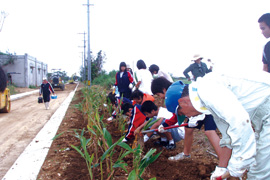The Mitsui & Co. Environment Fund
Introduction to Grant Projects
World Wide Fund for Nature (WWF) Japan
Kumejima Support Project - Developing and promoting Nansei island biodiversity conservation models that revitalize the region
Activity grant
- Project Description
The Nansei Islands contain one of the world's most valuable natural environments and the area is a candidate for being made a World Natural Heritage Site. However, its current measures for protecting against invasive species are insufficient and it has too few protected zones to be selected. Furthermore, large-scale landfill in areas with coral reefs, and roads being planned and laid through forests are escalating the conflict between conservation and development. There are regional organizations on each island working to provide environmental education and conservation initiatives, but shortages of manpower, funds, and information mean these efforts are not necessarily sustainable, and there is a need for collaboration and partnerships between the different parties involved. Kumejima is an area possessing great biodiversity, including Ramsar Convention registered wetlands, but measures to tackle red clay runoff are urgently needed. WWF Japan aims to position the island as a model site for implementing regional-focused conservation measures, such as fact-finding surveys of island environmental conditions, courses for local organizations and schools, and field activities.
- Fields
- Marine resources/foodPreservation of surface soil and forestsPreservation of biodiversity and ecosystem
- Grant year
- FY2009 Activity Grants
- Grant term
- 3 years
October 2009 - September 2012
- Grant amount
- 17,980,000 yen
- Activity region
- Nansei Islands, Japan

Overview of the Organization

- Representative
- Takamasa Higuchi, CEO
- Establishment
- 1971
- Establishment purpose
- WWF Japan carries out the activities listed below to contribute to the well-being of humanity through environmental conservation and it works with environmental enterprises around the world to spread conservationist ideas.
(1) Coordinating with WWF International and supporting various conservation initiatives, (2) carrying out initiatives commissioned by national and regional public organizations, (3) holding liaison councils with affiliated organizations, (4) conducting conservation-related research, (5) promoting and educating on conservationist ideas, (6) raising money to finance the fund's objectives, and (7) anything else deemed necessary to acheiving these objectives. - Main area of activity
- Worldwide
- Staff
- 58 full-time staff members
- Annual operating budget
- 613,11 million yen in 2006, 663.21 million yen in 2007, 849.41 million yen in 2008
- WEB site
- http://www.wwf.or.jp
- Recent activity
- Since the organization was founded it has engaged in conserving endangered wild animal and plant species, and recently it has been working to conserve a wider range of ecosystems, propose sustainable development that creates coexistence between humans and nature, and tackle global environmental issues such as climate change. The WWF has branches in over 50 countries, including Swiss-based WWF International, and is active on a global scale including initiatives in over 100 countries. It strives to build partnerships with local communities, organizations, corporations, researchers, and governments, and carries out initiatives based on principles such as respecting cultural differences, avoiding unnecessary intervention, and always pursuing dialogue.